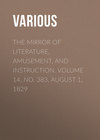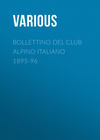Читать книгу: «The Mirror of Literature, Amusement, and Instruction. Volume 14, No. 383, August 1, 1829», страница 3
Feelings similar to those professed by the reviewer, have induced us to present the reader with his new light, which we hope is a just one. Of the little system of plunder carried on in some institutions at home, we can speak of one instance with certainty:—A relative near and dear to us as life's blood, had by money and comforts, (which but for this incident would have been kept secret), for many months relieved an inmate of a London hospital. The patient was a poor, old female, in the last stage of decrepitude, and fast sinking beneath the sorrows of life. She had seen happier days, and the only relic which she possessed of better fortune, was a pair of silver framed spectacles; which, on her death-bed, she bequeathed to her benefactress. The poor old woman's relations were dead, and this guardian-spirit who soothed her path to the grave, was her only friend. Such an act of gratitude was, therefore, extremely affecting, and her benefactress was anxious to possess the legacy—heaven knows, not for its intrinsic value—but as a testimony of rare and unaffected gratitude; yet, will it be believed, that the tempting bit of silver had not escaped the clutches of the nurses of the ward, and the spectacles were not to be found! Our informant related the circumstance with tears of indignation; we threatened to investigate the matter, yet her meek and mild spirit implored us to withhold: she too passed from us a short time after, and is, we hope, gone where her good deeds will not be forgotten.
PHILO.
NOTES OF A READER
MONT BLANC
The most interesting night of the late season of the Royal Institution, was the lecture or narrative, given by Dr. Clarke of his ascent of Mont Blanc in 1825. Dr. Clarke led his audience from Geneva to the summit, detailing the enterprise, which, however, he considers not by any means so dangerous as has been represented. At 9,000 feet above the level of the Mediterranean the air becomes extremely rarified, and the sky exhibits a blue-black appearance. He does not consider it at all safe for persons to attempt the ascent, having a tendency to apoplexy, for at the height of 15,000 feet above the level of the sea, the extremely rarified state of the air, as well as the almost unbearable oppression of the sun's rays, though surrounded with snow, would increase that tendency to an alarming extent. So oppressive is the sun, that on sitting down in the shade he was asleep instantly. The passage, just above the Grande Plateau (a surface of ice and snow, many acres in extent, 10,000 feet above the level of the sea) is a point of great difficulty. This chink is about seven feet wide and of immeasurable depth. To get over it the guides first proceed to render the passage more easy. He cautions travellers to pay implicit attention to guides, as the accident in 1822, when three persons sunk into the caverns of snow, was occasioned by this want of caution. It is appalling, said Dr. Clarke, to be carried over an abyss of unknown depth, slung upon cords and drawn over. On arriving at the summit of Mont Blanc the toils are amply repaid. Language cannot depict the scene before the traveller. The eye wanders over immeasurable space. The sky appears to recede, and the vision possesses double power. The Alpine scenery here is awfully grand, and the alternate thaw and freezing (for when the sun is down it freezes rapidly) produces the most grotesque figures. The only living creature found on the summit of Mont Blanc is a small white butterfly (the ansonia,) which flits over the snow. The chamois is found 10,000 feet above the level of the sea; Mont Blanc is 15,500 feet above the Mediterranean. Specimens were exhibited of the compositions of all the mountains round Mont Blanc. Periodically an immense quantity of snow falls down from the summit of the Mont, enough, as the guide said, to crush all Europe like flies. "On throwing stones down the precipices, thousands of feet deep, the traveller feels an almost irresistible desire to throw himself after them!"—Monthly Magazine.
FURIOUS DRIVING
In going upon the road, in the United States, it is looked upon as a sort of slur on one, if another pass him, going in the same direction; and this folly prevails to as great a degree as amongst our break-neck coachmen; and you will see an old Quaker, whom, to look at, as he sits perched in his wagon, you would think had been cut out of stone a couple of hundred years ago; or hewed out of a log of wood, with the axe of some of the first settlers—if he hear a rattle behind him, you will see him gently turn his head; if he be passing a tavern at the time he pays little attention, and refrains from laying the whip upon the "creatures," seeing that he is morally certain that the rattler will stop to take "a grog" at the tavern; but if no such invitation present itself, and especially if there be a tavern two or three miles a-head, he begins immediately to make provision against the consequences of the impatience of his rival, who, he is aware, will push him hard, and on they go as fast as they can scamper, the successful driver talking of the "glorious achievement" for a week.—Cobbett.
VILLAGE BELLS
—–'To the heart the solemn sweetness steals,
Like the heart's voice, unfelt by none who feels
That God is love, that man is living dust;
Unfelt by none, whom ties of brotherhood
Link to his kind; by none who puts his trust
In naught of earth that hath surviv'd the flood,
Save those mute charities, by which the good
Strengthen poor worms, and serve their Maker best.
Village Patriarch.
CURIOUS CONTRIVANCE
In the Pampas, when the natives want a granary, they sew the legs of a whole skin up, and fill it full of corn; it is then tied up to four stakes, with the legs hanging downwards, so that it has the appearance of an elephant hanging up; the top is again covered with hides, which prevent the rats getting in. In stretching a skin to dry, wood is so scarce in many parts of the Pampas, that the rib bones are carefully preserved to supply its place, and used as pegs to fix it in the ground. When a new-born infant is to be cradled, a square sheepskin is laced to a small rude frame of wood, and suspended like a scale to a beam or rail.—Brand's Peru.
SOUTH AMERICAN DINNER
A recent traveller thus describes a dinner party at Mendoza:—The day of days arrived; the carriage was flying about the town with a couple of mules, to bring all the ladies to dinner, in order to meet the foreign gentlemen. We were all seated higgledy-piggledy at table, dish after dish came in; every one helped themselves, no carving was required, being all made dishes. The master of the house was walking round the room with his coat off, very comfortably smoking his cigar, and between every fresh dish, of which there were some thirty or forty, the ladies amused themselves with eating olives soaked in oil, and the colonel, (one of the military pedlars), to prove that he understood foreign manners and customs, got the ladies one after another to ask the foreign gentlemen to drink wine with them, which was no small ordeal for us to run through. After these half hundred dishes, came the sweets; then the gentlemen's flints and steels were going, the room soon filled with smoke, and the ladies retired to dress for the ball.
EARLY HOURS
We learn that Mr. Cobbett dines at twelve o'clock on suppawn and butcher's meat, that he sups on bread and milk at six, that he goes to bed at nine, that he rises every morning of his life at four; that before ten o'clock he has finished his writing for the day, and, that though no man has written more than he has, that he never knew any one who enjoyed more leisure than he does, and has done. "Now is there a man on earth who sits at a table, on an average, so many hours in the day as I do? I do not believe that there is: and I say it, not with pride, but with gratitude, that I do not believe that the whole world contains a man who is more constantly blessed with health than I am. In winter I go to bed at nine, and I rise, if I do not oversleep myself, at four, or between four and five. I have always a clear head; I am ready to take the pen, or begin dictating, the moment I have lighted the fire, or it has been lighted for me, and, generally speaking, I am seldom more than five minutes in bed before I am asleep."
AN IRISH VILLAGE INN
The form and plan in all parts of the country are pretty nearly the same, though the furniture varies; the hospitable door (inns are proverbially hospitable) stands always open, but the guests are sheltered from the thorough air by a screen, composed like the rest of the mansion, of mud; the partition walls which separate it from the adjoining rooms reach no higher than the spring of the roof, so that warmth and air, not to mention the grunting of pigs, and other domestic sounds, are equally diffused through all parts of the tenement; from the rafters, well blackened and polished with smoke, depend sundry flitches of bacon, dried salmon, and so forth, and above them, if you know the ways of the house "may be you couldn't find (maybe you couldn't means, maybe you could) a horn of malt or a cag of poteen, where the gauger couldn't smell it." If you are very ignorant, you must be told, that poteen is the far famed liquor which the Irish, on the faith of the proverb, "stolen bread is sweetest," prefer, in spite of law, and—no—not of lawgivers, they drink it themselves, to its unsuccessful rival, parliament whisky. Beneath the ample chimney, and on each side of the fire-place, run low stone benches, the fire of turf or bog is made on the ground, and the pot for boiling the "mate, or potaties" as the chance may be, suspended over it by an iron chain; so that sitting on the aforesaid stone benches, you may inhale, like the gods, the savour of your dinner, while your frostbitten shins are soothed at the same time by the fire which dresses it.—Monthly Magazine.
Покупайте книги и получайте бонусы в Литрес, Читай-городе и Буквоеде.
Участвовать в бонусной программе




















